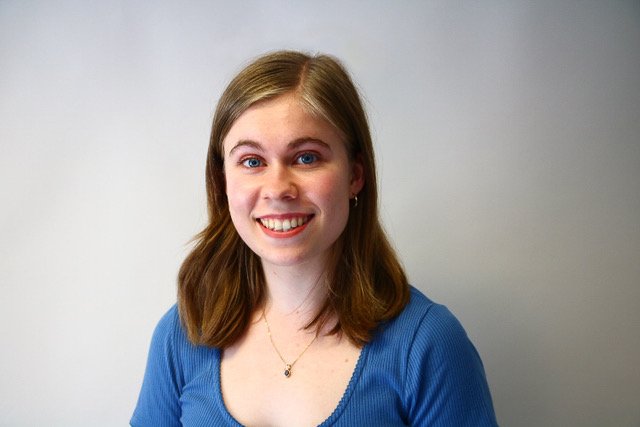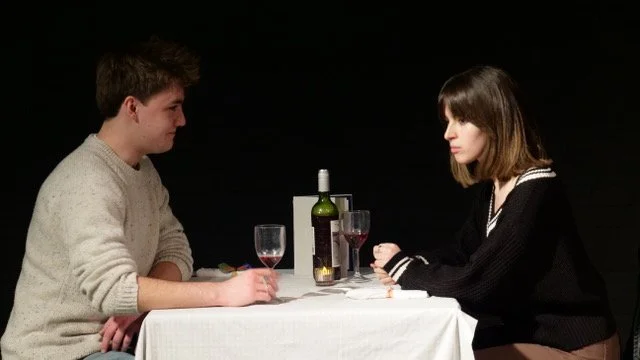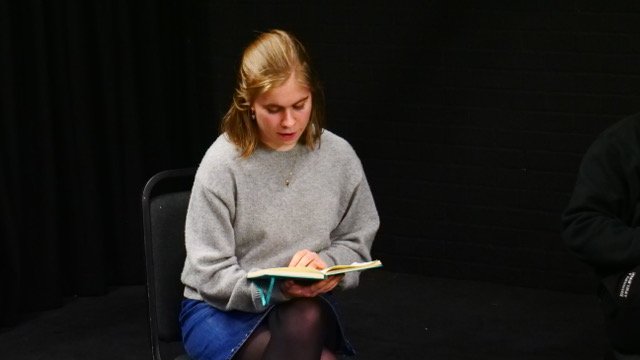Imogen Usherwood
Following the debut Oxford run of her play Bucket List, writer Imogen Usherwood talks to us about the competition she won that kicked off her career, how she put her play together and the female authors she’s currently into.
Have you always wanted to pursue a career as a writer?
I think it’s a bit of a cliche to say I’ve always known I wanted to be a writer, but there is a grain of truth in it, as with most stereotypes. As a child I was always reading, and I was always quite academic, so I thought maybe I would. I’d say the first time I actually realised it was something I could do, and made me feel a bit of validation, was when I was 15 and my History teacher told me I should enter this historical fiction competition, run by Penguin Random House for under 18s, and one of the judges was Sebastian Faulks, which really impressed me! So I wrote something and entered it, didn’t really think too much about it, but I ended up being shortlisted and actually won! I went to the award ceremony and it was just such a great day - I remember thinking “I want more days like this, I want to be around these people”.
Where did you go from there?
As I mentioned I was very academic, so for the next few years it was very much getting through my A-levels, getting to uni and all that stuff, but I was always writing. I won a couple more competitions, got published for the first time - I was published in the women’s writing magazine Mslexia right before I went off to Durham University. I studied English - I could’ve done another subject, but I realised English was the only one I really cared about! I wanted to read more books, I wanted to learn about storytelling - that was where I wanted to be. I did any kind of writing I could while I was there - I worked for the student newspaper, and went from writing to editing, but eventually realised that journalism wasn’t for me. I did a lot of theatre, a lot of playwriting - that wasn’t really something I’d considered before, but I kind of fell into it at Durham. I just threw lots of darts at the wall to see what’d stick, really!
What was the first piece of playwriting you had staged?
There were a few at uni. The first one was in February 2020, so the timing wasn’t ideal! It was my second year, it was a two-hander - Durham are really good in that if you have a play they’ll help you put it on. It was about mental health - one of the characters was a maths student, so it was kind of tied in to anxiety and numeracy and logic, tracing the idea of logic and numbers into mental health stuff. I did an adaptation of Mrs Dalloway by Virginia Woolf, which was really cool - the final performance of that happened the day before Durham shut everything down for the pandemic! We were very lucky to get it put on. I did a bit of directing, and a bit of acting as well, but very quickly stepped away from that!
Your most recent play, Bucket List, has just finished its run in Oxford - what was it about?
Marianne and Theo performing Bucket List
I wrote it between spring and summer last year, for my Masters in Creative Writing. You do a big project for your kind of dissertation, and I knew I wanted mine to be a one-act play. I didn’t really have an idea for a long time though, and just had to sit with it for a while, but I knew I wanted it to be a two-hander because if you take it beyond university it won’t cost that much because you only have two people to pay, and I knew I wanted to set to be quite straightforward. I knew though that I wanted it to have lots of scenes and to be able to play around with it, so I thought of plays I love which do that, like Constellations by Nick Payne and Lemons Lemons Lemons Lemons Lemons by Sam Steiner. I knew it had to be a love story as well, because as soon as you make something a love story it immediately becomes more compelling - we care about stakes in a romantic relationship, we care about love. I also knew I wanted it to be quite structure-based, as everything I’d written before I’d written while I was working or studying a lot, and hadn’t had much time to really sit down and structure something - I realised I wanted it to be told out of chronological order, and decided it would be about a relationship where something happens that changes everything for these people, and it’d move back and forth between the before and the after. For a long time I didn’t know what the “thing” would be, and I thought about all the storytelling books I’d read which said go big, raise the stakes, so I figured the biggest thing that could happen would be that one of them dies. Once I had the idea I automatically had more faith in it - I wouldn’t say the play wrote itself, but it became much easier.
How did you cast the play and find a theatre to stage it?
Once I’d written the play I showed it to my coursemates and asked what they thought, and everyone was keen to get it put on and help direct, produce, market it. We did it through the university, as there’s a lot of funding and support there. We went through Drama society and were able to put it on at one of their venues, at the Oxford Playhouse, where there’s a kind of 50-seater black box. To cast it we held self-tape auditions, we invited students to send in videos, and we actually had to hold callbacks over Zoom as it was Christmas break! We got extremely lucky - we ended up with two brilliant performers, Marianne Nossair and Theo Joly, who are extremely talented. As soon as we saw their tapes we knew they were really good, and we had such a brilliant stream of actors come through for it.
Do you have any plans to run the show again?
Nothing set in stone at the moment, but we’d love to - I really hope this won’t be the last time it gets performed.
Is there anything you’re working on at the moment?
So I’m currently ploughing through a novel right now, which is very difficult, but a lot of fun as well. It’s a lot of going back and forth writing and rewriting, but I’m really enjoying it. I’m also playing around with some short fiction - it’s nice, when you have this kind of overwhelming, big project that you occasionally don’t know where to begin with, to be able to go away and work on something much smaller.
As a young female writer, how do you feel about the recent proliferation of fiction exploring the lives of young women? Do you think there’s much authenticity in these stories?
I think it’s a brilliant time for female writers - it’s a really thriving industry, a lot of it challenging what we think fiction about women is. I do find it frustrating though when female authors find themselves compared to, or pitted against, each other - there was an article a few months ago holding Sally Rooney and Eliza Clark to the same standard, as if they’re writing the same kind of material, when they absolutely aren’t. They’re both young, attractive, female writers, but they’re writing in completely different genres. I think it’s very unhelpful to lump women writing fiction together, as we’ve never done that with men. So I think on that level it’s frustrating, but what I’m really loving is that we’re seeing a lot of weird, dark books by women, the kind of stuff written by Eliza Clark, whose work is subversive and and dark and cruel, and I recently read a novel called The Bookseller by Alice Slater, which is very twisty and funny. We’re also seeing a lot of women in historical fiction - Maggie O’Farrell is a brilliant writer in that genre. I think there’s room for women to write all these different kinds of books, and I’m currently figuring out where I fit amongst all this.
How long have you been working on your novel, and what genre(s) would you say it is?
I’ve been working on it for just over a year. It’s kind of in fits and starts where I’ll work on it really heavily then kind of step away for a little while, then I’ll rewrite the whole thing. It’s evolved a lot over time as well. It’s a variation on the traditional campus novel, set in Oxford but during the summer vacation, focusing on three different characters who have found themselves spending a month in this strange, elite city for very different reasons. I won’t say too much but it’s a story about lying - lots of lying - and realising that the systems which have always kept you safe, like university, won’t be there forever.
Words: Scott Bates


